Why Young Thug is the 21st Century’s most influential rapper
(Image credit: Getty Images)
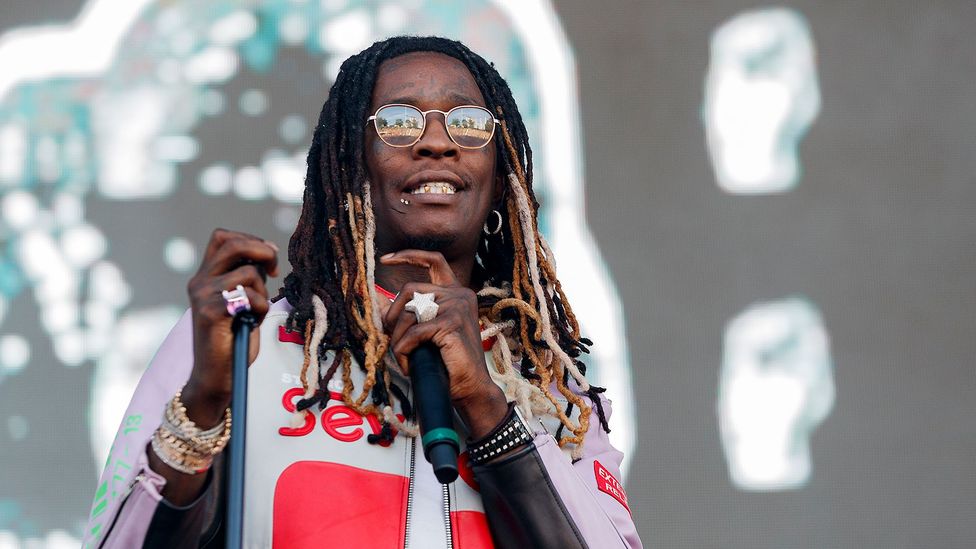
The Atlanta star has become his own genre; he is the sun king at the centre of rap’s solar system

If you haven’t heard of Young Thug, the chances are you’ve heard someone who sounds like Young Thug. The Atlanta rapper, born Jeffery Lamar Williams, has been a growing force in hip-hop for the better part of a decade. His instantly recognisable alto has been slithering and crawling its way up the charts for almost a decade, but the last 24 months have seen Thug rise to become the sun king at the centre of rap’s solar system.
In 2019, Young Thug became his own genre. He won his first Grammy for backing vocals and ad-libs on Childish Gambino’s This is America. Thug’s last album So Much Fun debuted at number one in the United States, a commercial culmination that displayed the artist’s musical contrasts in all their glory. It’s his answer to Lil Wayne’s career-defining Tha Carter III, a smartly-constructed distillation of his appeal – more coronation than a classic – diluting his berserk experimentation in favour of a restrained fluorescent joy that could appeal to suburban teens discovering vape pens and rap for the first time.
As well as topping the album chart, he briefly occupied 11 spots on the Billboard Hot 100, including his Post Malone collaboration, Goodbyes, which still receives over a million streams daily. And yet, Thugga’s most impressive legacy is his army of imitators; young artists who discovered that there’s money and fame to be made from idiosyncratic rhymes and unconventional sounds.
In the early 2010s Thug emerged from Atlanta, the city that has largely set the tone for hip-hop across this decade. The conventional narrative around Thug’s convention-melting screeches and warbles always considered him far too extraterrestrial, idiosyncratic, and hostile to the promotional demands required to become the chart-topping festival-headlining star that his talent warranted.
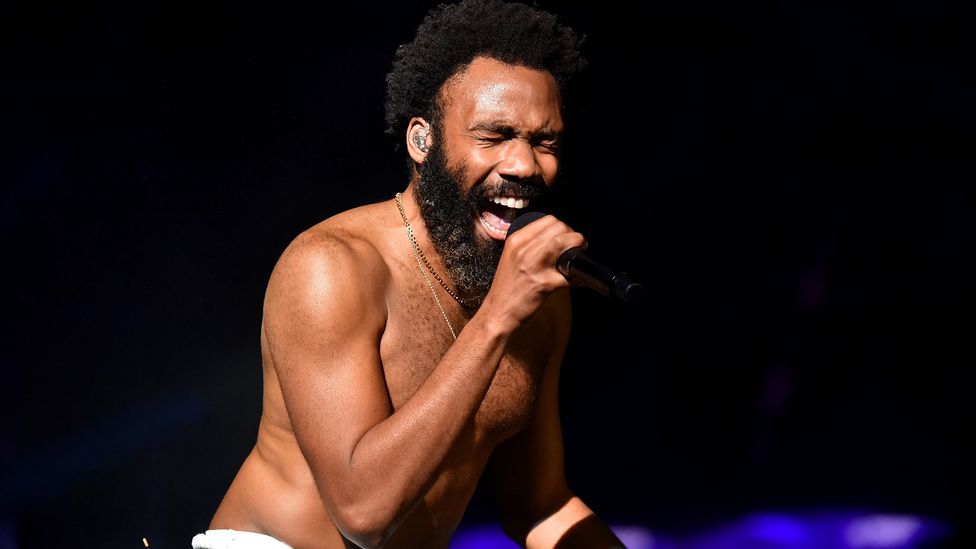
Young Thug even appeared on Childish Gambino’s This Is America, one of the decade’s biggest tracks (Credit: Getty Images)
Yet, the 10th of 11 children from the Jonesboro South projects in Atlanta has become ubiquitous on the Spotify US Top 50, even when he’s not in plain sight. Consider Camilla Cabello, the ex-Fifth Harmony singer – her biggest solo record is Havana, her 2017 collaboration with Young Thug. Or Drake, the most commercially impactful rapper of the decade, who has repeatedly cribbed Thug’s slippery electric-eel cadences, most notably on last year’s track Mob Ties.
In rap, influence usually begins regionally and expands outward. So, it’s unsurprising that practically every recent Atlanta artist owes paternity to the rapper briefly known as SEX. Take February’s Three Headed Snake from Gunna, a rapper signed to Young Thug’s label YSL. Last year, Gunna and another Thug protégé, Lil Baby, broke beyond the Rolling Loud discourse with Drip Too Hard, an unofficial spinoff of Future and Thug’s Drippin on Me.
The difference between homage, imitation, and apprenticeship may remain forever murky. The old rap line held that no biting was allowed was summed up by Wu Tang Clan’s Raekwon: “I don’t want no one sounding like me on no album.” A more equanimous view came from TS Eliot: “Immature poets imitate; mature poets steal; bad poets deface what they take, and good poets make it into something better, or at least something different.” Even someone as revolutionary as Thugger couldn’t have existed without his acknowledged idol, Lil Wayne, whose slurred codeine hexes splintered rap’s possibilities in a thousand directions.
Listening to Thug’s first mixtapes from the beginning of the decade, the dragon-in-couture croak and Jabberwocky rhyme schemes that followed are absent. It’s all muted riffs on Wayne. Even on his first notable project, 2011’s I Came From Nothing 2, he remains in thrall to his hero, though songs like Keep In Touch revealed his limitless potential. Like all of Thug’s best work, the track is resistant to critical rambling. It’s built on puppy-dog romanticism that could have come from Motown… if it were hijacked by a 6-foot-4-inch nose-ringed, gambling-obsessed, ex-high school quarterback from the slums.
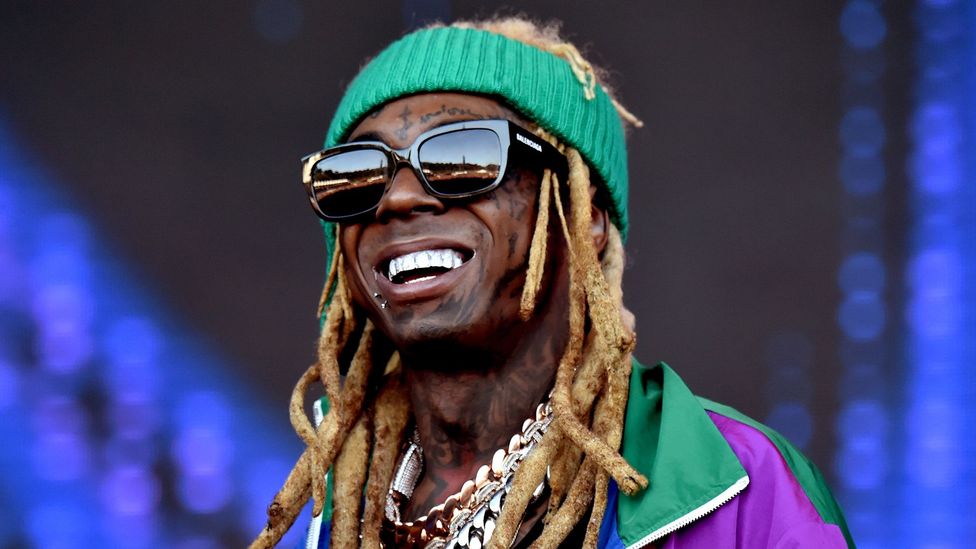
Young Thug’s rapping style owes much to his predecessor Lil’ Wayne (Credit: Getty Images)
Young Thug’s breakthrough came with 2013’s Stoner. It was an entirely different species from what had come before, forged from a DNA mutation whose bloodstream was equal parts strawberry jolly rancher, promethazine, weed, molly, and esoteric powders beamed in from the plug on Betelgeuse.
On Stoner, he shrieks and moans, vomiting nightmare cantillations and euphoric wails, stretching syllables until they collapse under the stress, disappearing into the vanishing point. He spell-screams “L-E-A-N-I-N-G” like a spoiled child begging to open his Christmas presents early, but discovering that the only things under the tree are Styrofoam and codeine. Thug’s voice contorts into neon lava; he uses it like Jimi Hendrix using a wah-wah-pedal. It’s a live power cord writhing in the street during a lightning storm.
The next three years marked a run that can match nearly any creative streak in history. There was the Rich Gang project with fellow Atlanta MC Rich Homie Quan (whose own stylistic influence is often overlooked), which somehow fulfilled Quan’s boast that they were the “hardest duo since OutKast”. As for Thug’s solo work, the first two volumes of the Slime Season series are deliriously improvised masterpieces, often overlooked because like Rich Gang, they never made it onto streaming services. The zenith may have been 2015’s Barter 6, his first project made available for commercial release. There’s arguably his most innovative song, Halftime, where he introduces half-a-dozen different flows, switching direction with the startling agility and blinding speed of a Simone Biles floor routine.
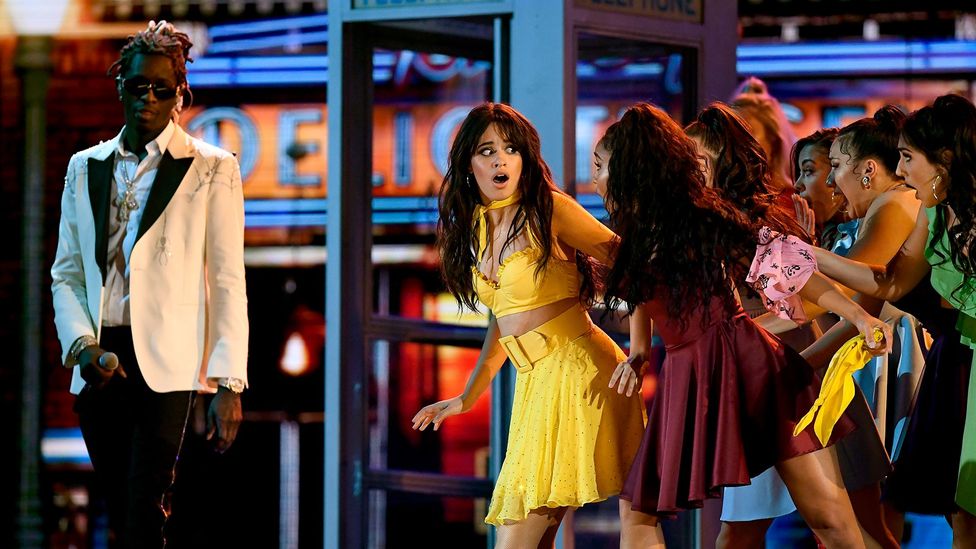
Camila Cabello (second left) is one artists who has scored hits thanks to Young Thug’s influence (Credit: Getty Images)
To date, his rap family hasn’t captured the full summation of what has made Thug immortal. Each of his proteges seem to work within a small parcel of his flows, melodies and vocal textures. It’s nearly impossible to guess who will end up surpassing him, or at least annexing new territory. It could be his “little brothers” Gunna and Lil Baby, whose collaboration Drip or Drown 2 reached number three on the Billboard album charts earlier this year. This summer, Thug and Future announced that the little brothers would join their elders for a Super Slimey sequel, forming an Atlanta rap Avengers.
That said, there is an argument that the first half-generation of Thug-influenced rappers have already transformed his innovations into something singular. Travis Scott famously cribbed Thug’s Pick Up the Phone for one of his first huge solo hits, and it’s obvious that the Houston rapper’s ad-libs, vocal pitch and melodies are derived from Thug, albeit blended with 808s and Yeezus-era Kanye).
Playboi Carti has become one of the biggest artists of the moment by triangulating Chicago artist Chief Keef with Thug. Philadelphia-born Lil Uzi Vert rapped like Meek Mill until he moved to Atlanta, signed to DJ Drama’s label, and popped up on Slime Season 2.
Of course, weighing art is more complex and inscrutable than merely playing a game of spot the influence. A hit song like Lil Uzi Vert’s XO Tour Llif3 was clearly informed by Uzi’s own life and emotions, not to mention the mall punk of the last decade. But it’s hard to imagine it existing or having the impact it did without Young Thug laying the foundation.
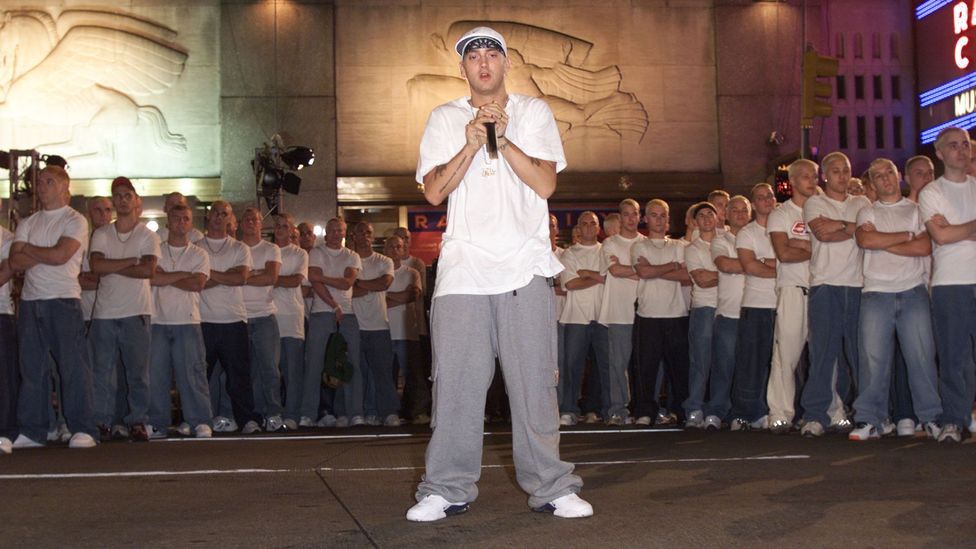
Eminem’s attention-grabbing VMA show in 2000: Young Thug is this generation’s equivalent (Credit: Getty Images)
It’s been 20 years since that MTV Music Awards where Eminem famously stormed the stage with a hundred lookalikes with bleached hair, white tees, and blue jeans. The idea was that he embodied the millions of aggrieved middle-American white boys obsessed with rap, who up until that point hadn’t seen themselves credibly represented within the genre. For a year or two after Eminem blew up, every major label attempted to trot out their own Eminem replicant, but none survived (save for a few classic Bubba Sparxx singles).
But now tastes and music distribution models have changed, and with it, the desire to hear artists that are better or at least different. If you were going to redo that same awards show today, you might do it with 100 Young Thugs standing in a straight line onstage, the alien visionary at the forefront, his descendants in designer clothes and dyed hair, taking his cue and rapping along simultaneously. It would be hard to hear the difference over the sound of the applause.
More on BBC Music’s greatest hip-hop songs of all time:
The 25 greatest hip-hop songs of all time
What critics had to say about the top 10
Full list of critics who participated – and how they voted
Trends and surprises in the poll (not available in UK)
Why are there so few women in hip-hop polls?
Playlist of the top 25 songs (Spotify)


